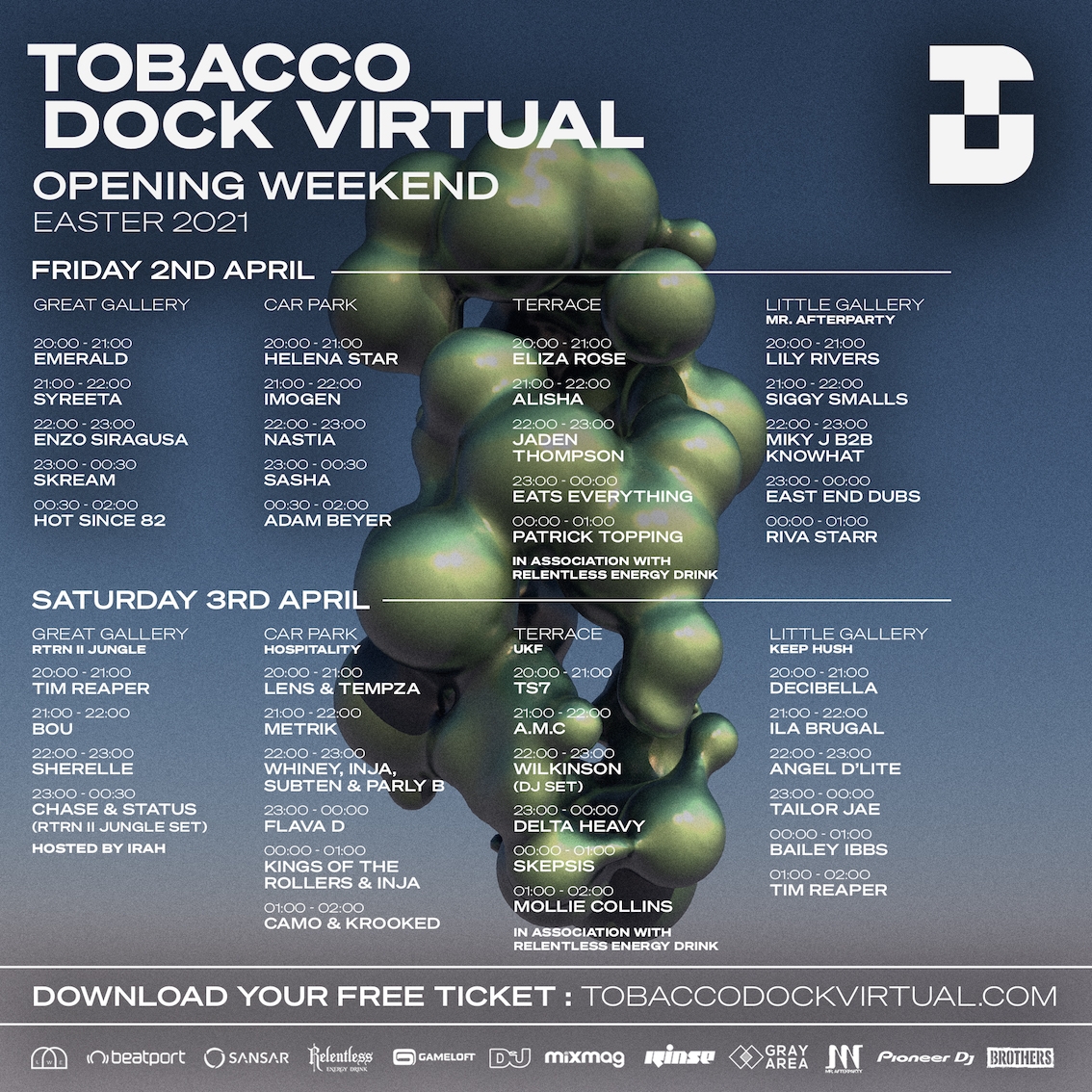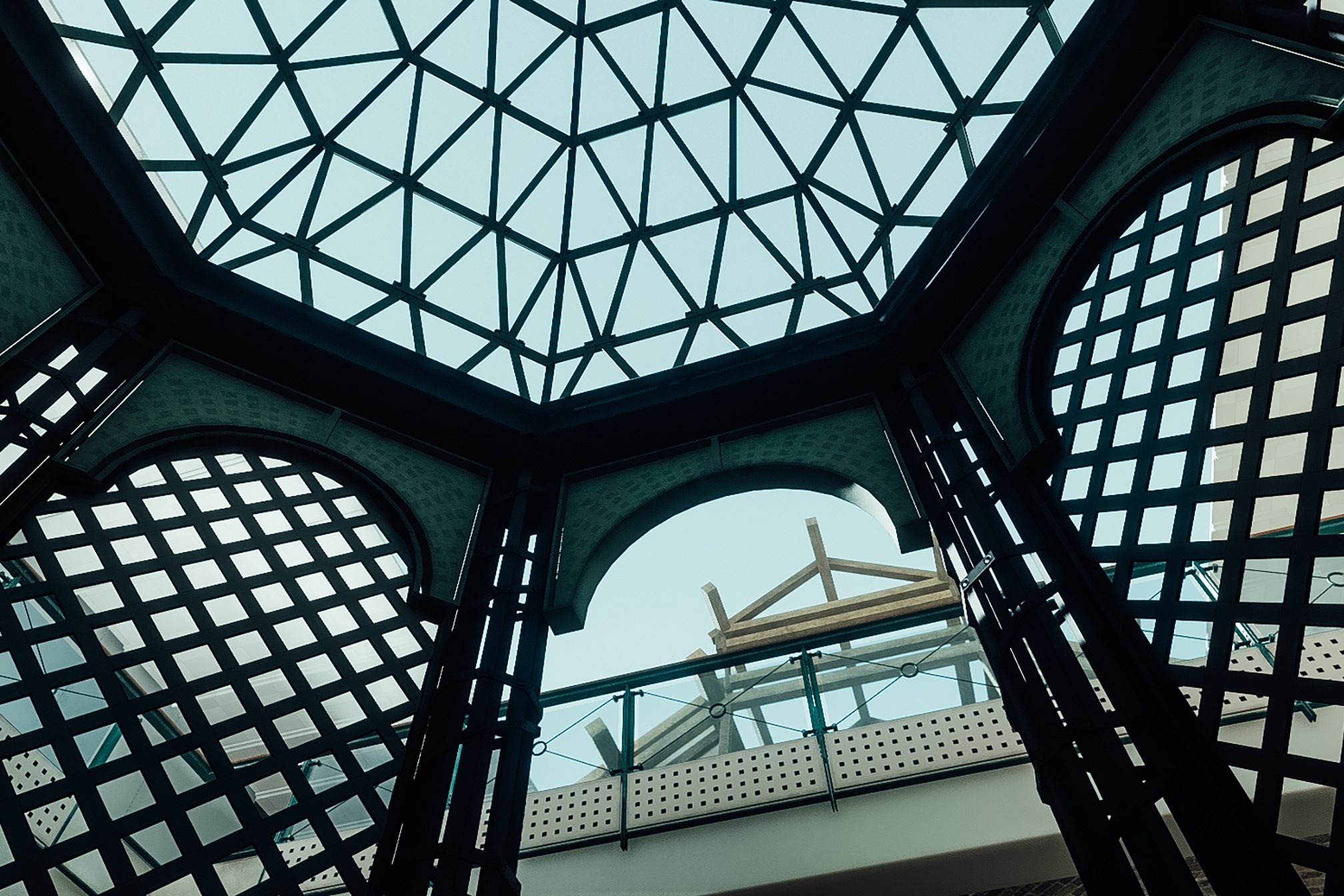 Features
Features
Tobacco Dock Virtual is taking virtual raving to another dimension
We spoke to LWE about Tobacco Dock Virtual and the upcoming Easter weekender
There's no escaping the fact that virtual raving is now well and truly a thing. Chat about virtual reality events and raves had been going on for a while, but it took a global pandemic and closure of nightclubs to really get the headsets charged up and dancefloors on your computer screens. Virtual raving's become the norm over the last 12 months, with ravers swapping nightclubs for living rooms.
LWE - the team behind Tobacco Dock and Junction 2 Festival - have taken the plunge into VR raving and they're throwing a huge party over Easter weekend. Following Junction 2 Virtual last year, LWE presents Tobacco Dock Virtual - a two-dayer bringing together the likes of Patrick Topping, Nastia, Chase & Status, Skream, SHERELLE, Emerald, Tim Reaper and more.
LWE worked with virtual reality platform Sansar to recreate Tobacco Dock in digital form, and attendees - in avatar form, of course - will be able to experience the Great Gallery, the Car Park, the Terrace and the Little Gallery like they've never done before. With a soundtrack of house, techno, jungle and more, you'll be able to interact with other ravers, explore the venue and jump into various activities aside from just dancing.
The team don't see a limit to virtual reality raving. Even when clubs reopen, they plan to integrate raving IRL with raving in VR. We caught up with LWE's Paul Jack and Will Harold to chat about their vision for Tobacco Dock Virtual, how it was developed, how it plans to stand out among its VR counterparts and their long-term plans.
What are your ambitions for Tobacco Dock Virtual?
Paul Jack: I guess the place to start really is, with everything shutting down as it did 12 months ago, it put us in a slightly difficult position, where we were sitting there - me and Will - procrastinating about what to do next while tearing our hair out and cancelling a year’s worth of work in a day. The first reaction to it was to do the Junction 2 Virtual Festival, which we did in July.
That was very much a replacement to mark the occasion of the event taking place. We never really had, in our mind, the idea of going hard into a digital strategy, but doing that show online - and the success of it where it did just over three million uniques - really opened up our eyes to what is possible. But possible in a way that - not only do we want to do something that is digital - but something that forms part of our long term plans in the future. That focus on wanting to do something that had a long-term plan is what drew us into the idea of seeing what we could do with one of our ongoing event spaces, which is obviously Tobacco Dock, and how that could be translated into a digital event format. But at the same time, for it not to be purely digital, but also with the long term vision of it being something that can exist both as a real venue and as a digital venue. That's that's what kind of when Tobacco Dock’s the right idea for it. By building something that was a one-to-one replica of the space, it allowed us to host events when events can't take place, which is what's happening on the Easter Bank Holiday. But going forward, it allows us to host events, both at Tobacco Dock and in the virtual space running in parallel with each other. You'll be able to go to the live show, but at the same time, anywhere you are in the world, you'll be able to go and attend that event in a virtual capacity.
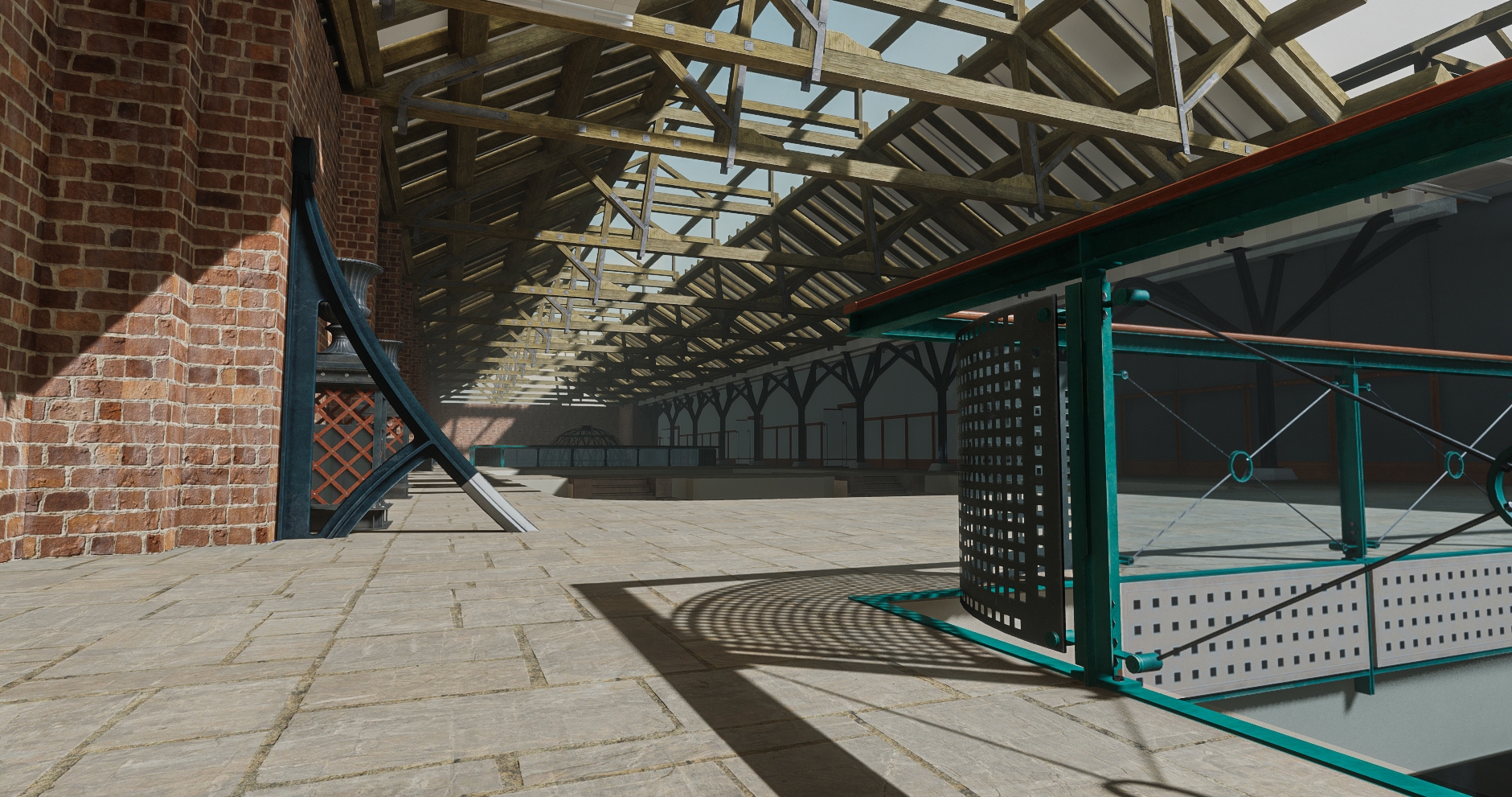
You've said you will tear down barriers between the digital and virtual worlds. How will you do this?
PJ: It’s a bold statement. One of the things we're looking at, when we're doing this, is, one, by building a digital event venue that is rooted in history and the identity of something real. I think that is helping to position the idea where these are real events. I think that's kind of a one-sided approach or a starting point from it. So much of the digital events out there at the moment are very much built or exist within a purely digital space. Here you've got something that is entirely based on the history of something that exists and is bricks and mortar, but yet is reimagined in a digital capacity. When the events actually take place we are very much looking at a crossover between both of the mediums.
To give you an example, Tobacco Dock virtual in a Tobacco Dock real [event], we're going to have screens within each of the venues which will allow us to create windows of reality, which effectively means you're able to look at screens in Tobacco Dock in real time and see real-time avatars walking past in a digital world. In a virtual world you're going to be able to see real people walking past in real time while you're in the event in a digital way.
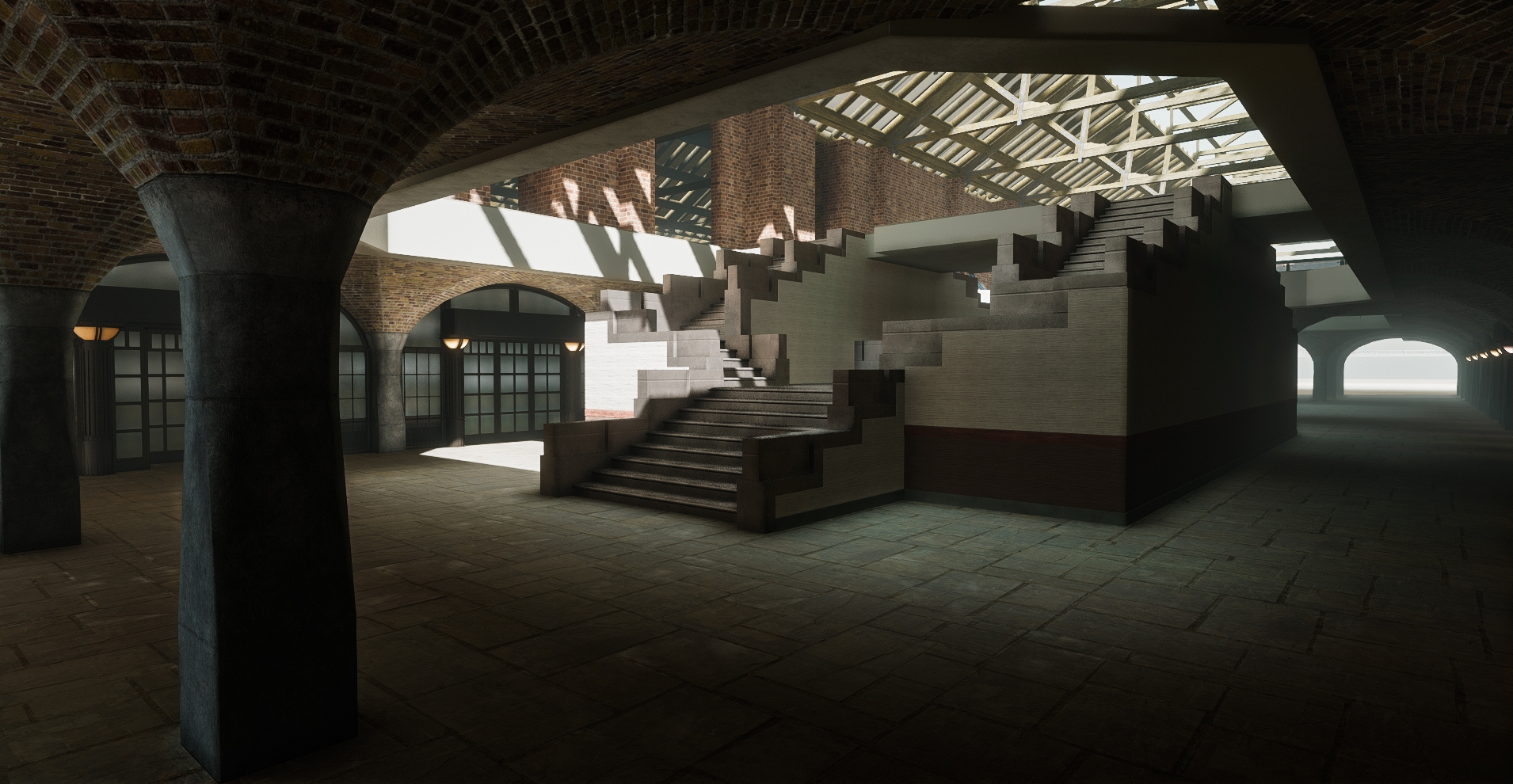
What did you take into consideration when developing TDV?
PJ: Trying to create something that is as realistic as possible. Something that allows you to have the ability to explore an open world format and and actually genuinely be able to navigate the space. Allowing you to interact with people in real time and make friends. Going from room to room to explore different artists like you would at any other event. Just having that feeling of being at an actual event, rather than it being a simple case of watching a live stream. In the essence of a live stream, it's very hard to try and replicate a live event, which is people movement, interactivity, exploration, adventure, discovery, all those kinds of things.
Will Harold: I think it was really important as well, that we were quite clear that we're never trying to replace clubbing. I think that's something that is a very different experience. It is something that we're adding to that experience rather than trying to design something that was going to compete with it or replace it. That's something we always had quite firmly in our mind.
How will you deliver a rave experience as close to real-life as possible?
WH: I don't think they are similar things. They're designed to be consumed in totally different ways. We've taken our experiences as promoters. One of the things that stuck out from our first foray into Junction 2 Virtual was the social nature of the platform that we created. We had this old-school, almost MSN Messenger-like element to that. It was reminiscent of a kind of a smoking area or a hangout space within a club. That was one of the things that stood out to us. I don't think you can replicate the feeling of being on a dancefloor. What we can do is have the essence of people coming together from all walks of life, to share music that they love, but then also to interact to engage. It’s those elements which I think we can more accurately replicate. It's about creating new experiences, rather than trying to just copy old ones.
You’ve said gaming will be a key aspect to “amplify” and “enhance” the experience. How will this work?
PJ: The ability to create your own characters, which is in the form of an avatar. You can customize, dress and interact with them. Once you're in that space, with this avatar you created, we're working on lots of different ways for people being able to interact with the space other than just the music. One of these things is something called Broken Record, which allows people to go and collect pieces of a different record in different spaces throughout the venue. You put these pieces of record together to create a track by headliners. Another one is your ability to go and control the lights and be the lighting technician. Another one is collecting different items and be rewarded with digital merch or be rewarded with in-game activities. We're talking to Bradley Gunn Raver and we've created a game called Where's Bradley? That game is controlled in real time by a real person. We've got an avatar that looks like Bradley and you need to go and find him through the venue and he's going to be appearing and disappearing. When you find him and catch him in different places, you get to win his goggles or his BGR T-shirt. Things like that which are feeding into exploring and getting people to interact with other people. Taking those kinds of things and gamifying them to that extent.
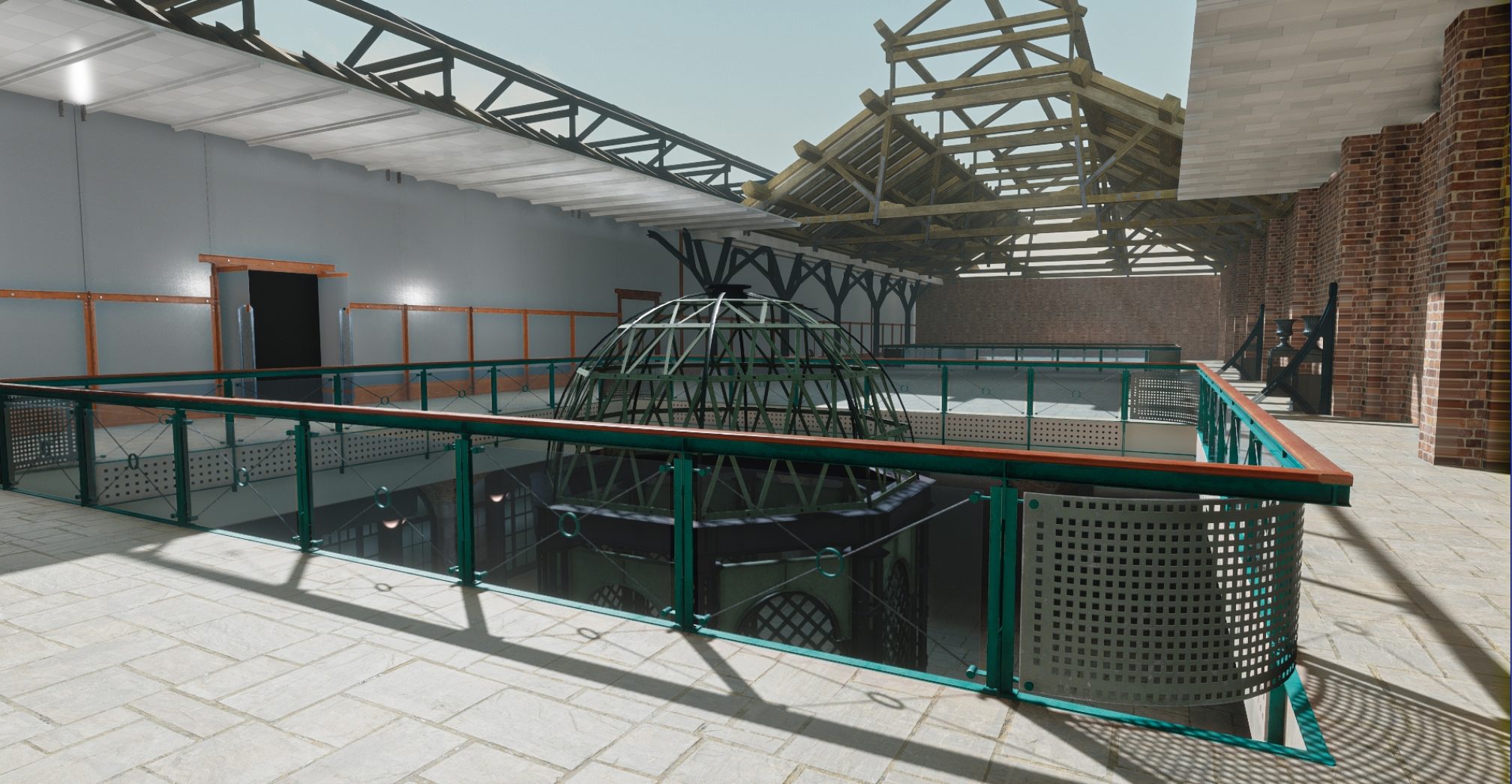
‘Collaboration’ is another key aspect. What will this entail?
It's collaborating with artists and labels to create bespoke experiences within that space. Without naming the artist, there’s an artist who’s launching a world tour. Anyone that attends one of the tour shows will be given an invitation to attend a special ’end of tour’ show at Tobacco Dock Virtual - to bring all of their fans from across the world together in one place. Within this space, you'll then restream and do original content from throughout the tour. But allowing the idea of everyone from around the world to congregate in this one space together at the final bit is one of the ideas we've explored. We’re speaking with brand partners to do different ways of activating their brands, but finding ways of activating brands in a way that creates a gameified experience for people in the environment. One of them being drinks companies where, for instance, you can become a virtual barman. You go up to the bar, you speak to the bar, you become the barman, you can make up your own cocktails and just interact with the items in there. You're only really limited by your imagination. You can pretty much create anything. It's just kind of down to ideas really and putting your time into making them happen.
How does the development process with Sansar work?
PJ: What Sansar does as opposed to everybody else is the level of graphics and interactivity they can put together. For me, it far excels what other environments are currently doing. Where you go into the dominant space, which is obviously Oculus and Quest. The experience on there, which is just wireless headset only - is fairly stripped back. The lack of feeling of realism, clarity, texture and the level of graphics we would like to have or we are going to have that need to be there to really represent - as best you can - an event experience in a digital format.
Were there any big challenges you faced?
One of the biggest challenges is that they're [Sansar] based in the United States and we're based in the UK. With COVID and the lack of travel and transportation, having someone working on a complete one-to-one render and rebuild of a venue in a digital capacity that they've never been to involves an immense amount of work and time from both sides in providing creative photographs, details, exact schematics. Walking through every single kind of square foot to the venue in real time to remap it in a complete one-to-one kind of format. I think taking some of the ideas we wanted with lighting, it has really pushed the technology. Where some of the lighting and effects in VR are cool, they still come across a bit childish and a bit gamey. What we've done is spent an awful lot of time working with their developers and providing details and examples and programming the lighting itself to be as representative of a live event environment as can be done at this time.
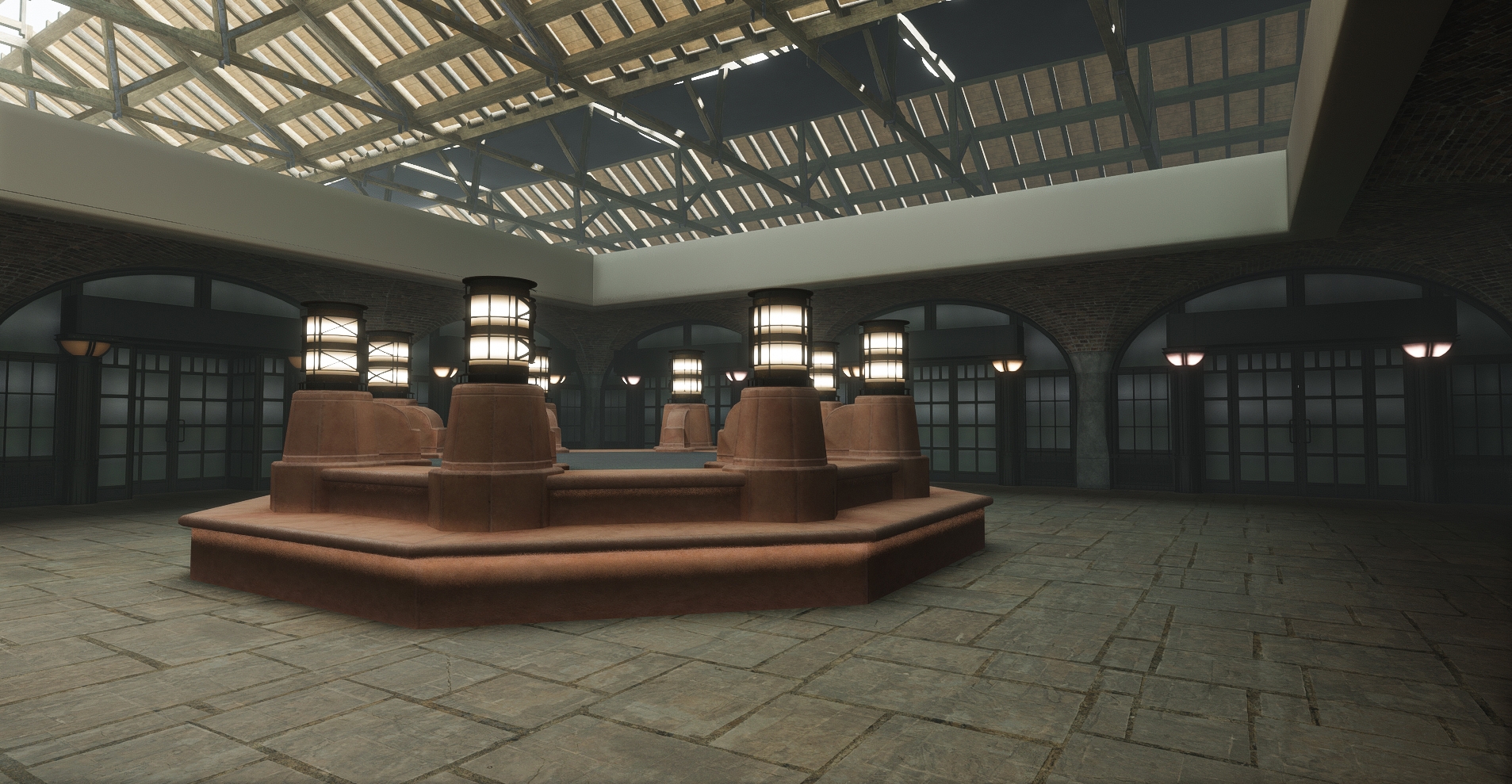
You have a goal of a “hybrid clubbing space”. How do you see Tobacco Dock Virtual working once real-life clubs reopen?
PJ: When doors open in London, doors will open at the same time in the virtual Tobacco Dock, where each of the artist’s performances will be live streamed in real time. You'll be able to watch the same artists, in real time, broadcast into the digital venue. In each venue, you'll be able to interact with and see the other world by looking through these virtual windows. Effectively, there will be LED screens in Tobacco Dock in London, which act like windows into the digital one. We'll have the same virtual windows in the virtual Tobacco Dock, being able to look in real time into the actual event. You'll be able to walk and stand in a crowd, look at a screen in a virtual one and see the real crowd at the same time. We will have a VR lounge in Tobacco Dock in London, where as a person attending the event, you'll be able to go into that VR lounge, put the headset on and actually step into that same event.
What impact do you think VR will have on the music industry in a post-covid environment?
PJ: I think it’s going to grow it. There's no doubt it’s been a shit time for everybody. But at the same time, it's allowed people to pause and think and see what else can be done. I think us to be doing this is opening the music up to a much bigger audience, where an event is naturally limited by capacity and location. There's plenty of people up and down the country who’d like to go to a Tobacco Dock show. There's plenty of people in other countries who would like to go to a Tobacco Dock show. There's plenty of people who'd like to go to events who can't afford to go to events. Or they're not 18 plus. By opening up this additional platform to it, it's not about replacing events at all. It's about adding a different way of being able to explore events and experience that kind of music and enjoy it in a different way.
Will VR be key in keeping older ravers connected once they have families, move away from friends etc?
PJ: You'll be able to screencast this onto your TV. So when you screencast onto your TV, you will be able to then control it using an Xbox or game controller on your TV, navigate around it, and be able to talk people through a chat facility or speak to people by voice in real time. In a different way, you can still have a fun night out or a fun experience and feel like you're part of something bigger that is happening in real time. By actually having that feeling of exploration and that visual kind of crossover of seeing the real one within the digital one at same time, I think you allow people to have experienced some of that without necessarily leaving the home or being able to leave the home.
WH: It’s quite early for the technology as well. As more people get it right, imagine the experience of music videos and how that will change. People will then start to create content specifically for the platform. We're very early in the life cycle of it, and I think we're only really scratching the surface of one of the most versatile formats that we've encountered.
Read this next: 48 of the best 90s techno mixes you can listen to online
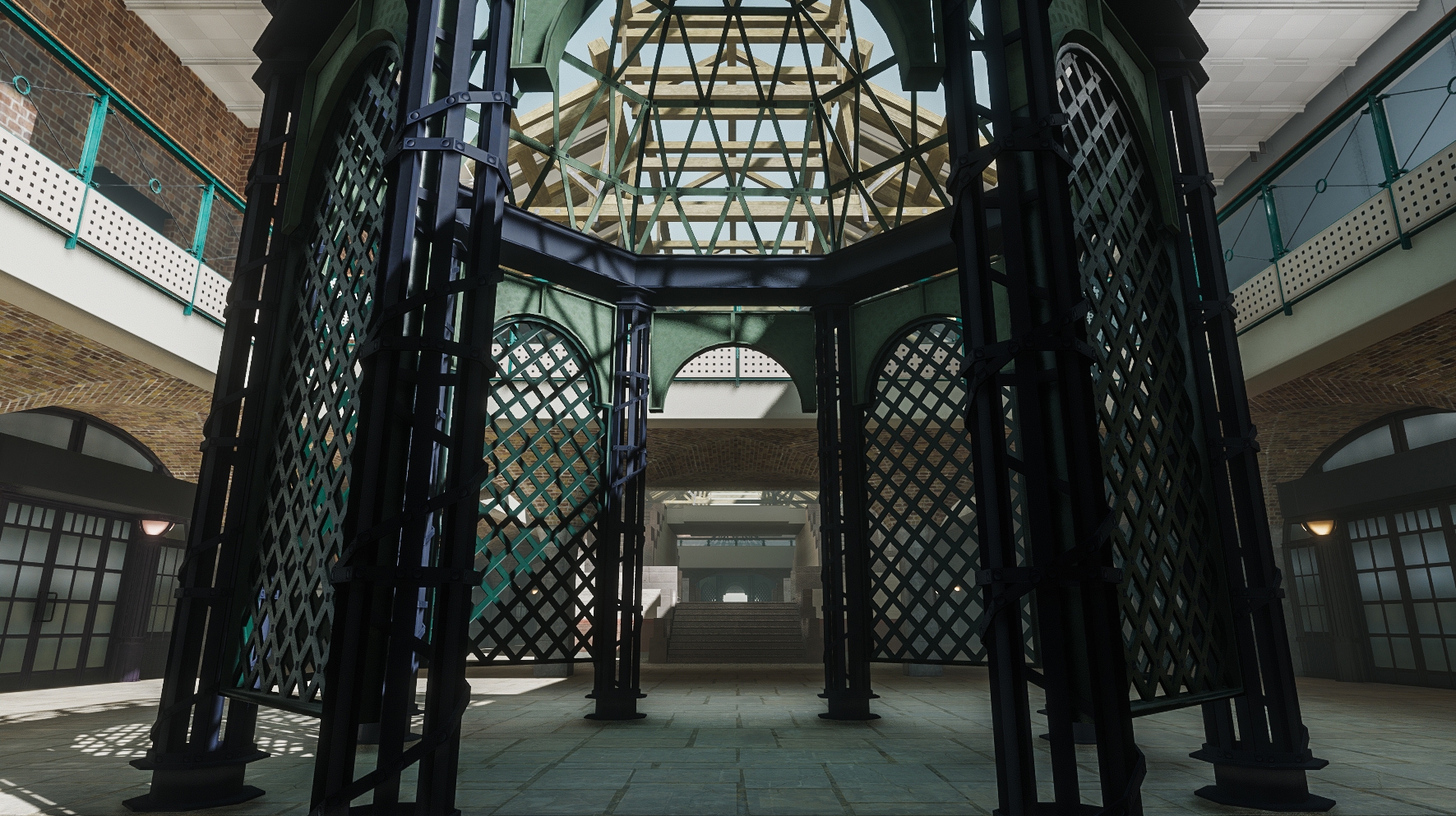
How will TDV stand out among VR counterparts such as Lost Horizon?
PJ: It's rightly so that you mentioned something like Lost Horizon, because obviously Lost Horizon sits within the same platform. Seeing what they did was very much part of the full process of coding. Not the full process, but they've been an inspiration for the kind of things that can be done in the space. I think what differs in our approach is, where theirs is built very much on a make-believe venue, which sits within a digital landscape, ours very much crosses over by being built in a real space that is being digitised. I think that's quite an important difference between the two different types of offerings.
How does the development process with DJs work?
PJ: DJ performances are green-screened and put into the world for purely digital events. For live events, they'll be broadcast via live stream. Effectively, the DJ booth will be replaced by a digital screen in the VR venue and they will be broadcasting the last live performance. On some special events where we're looking at dedicated live bands and performances, you'll be able to create customised avatars where the artists themselves will be able to put the kit on and perform live.
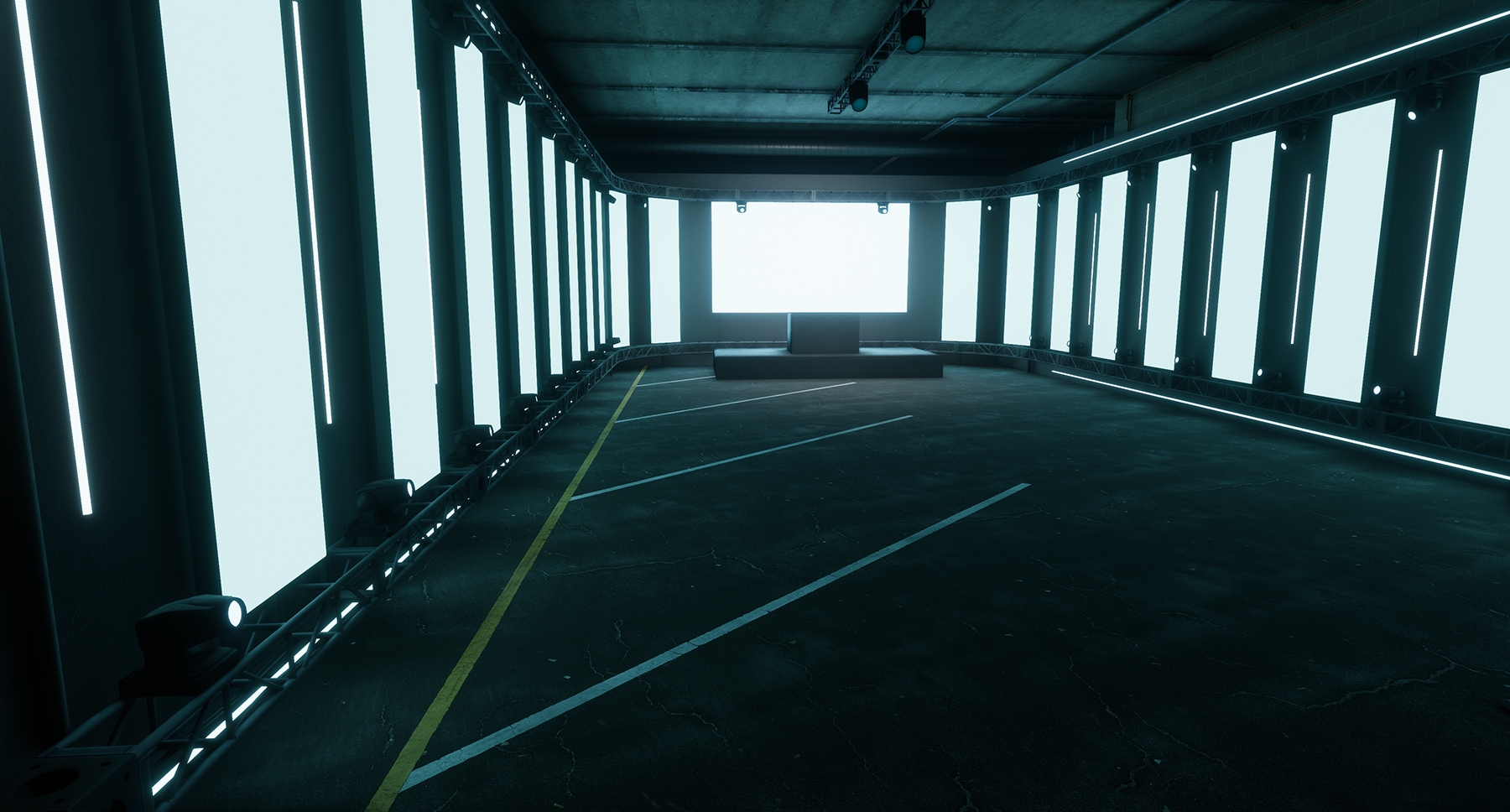
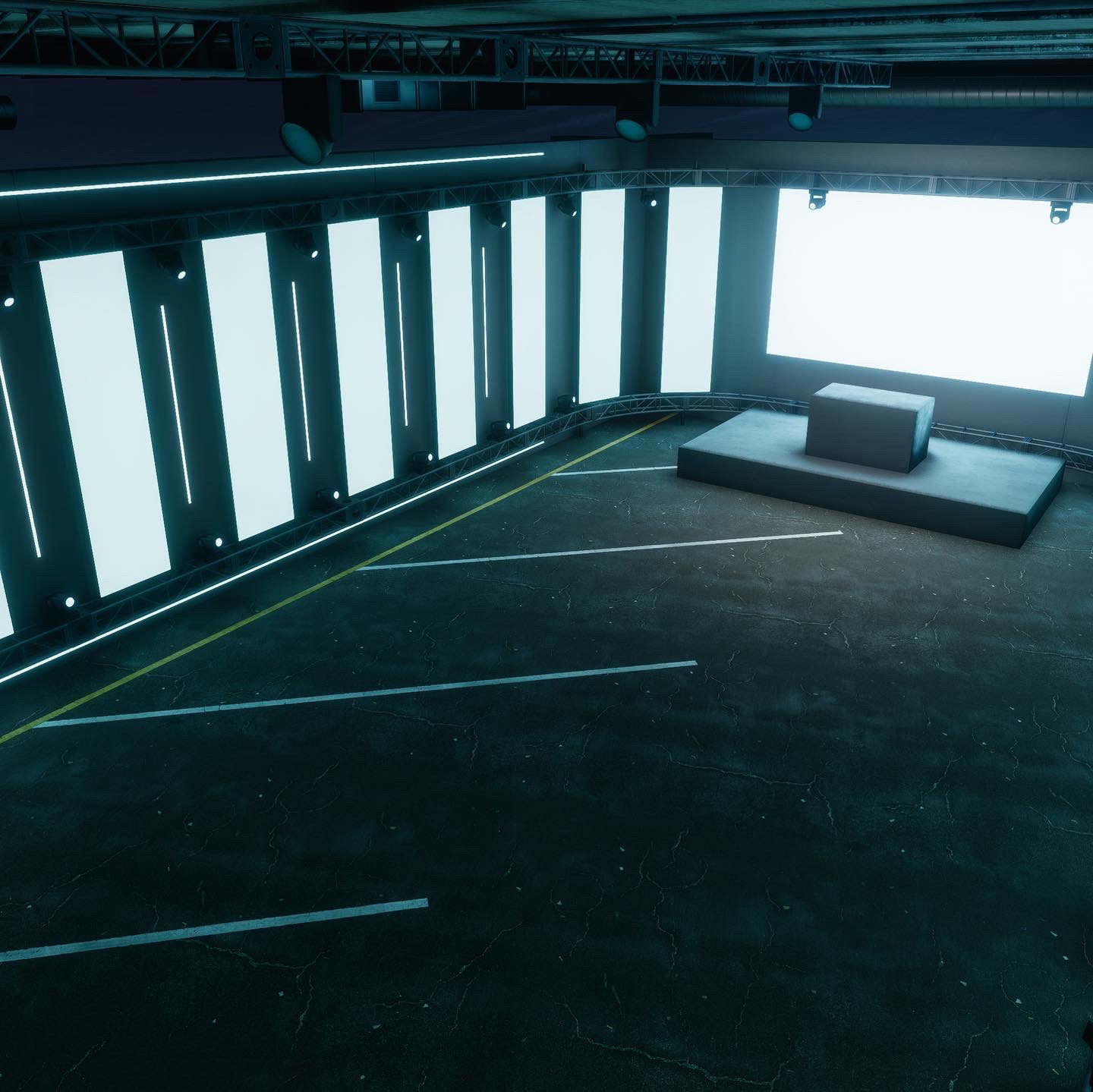
Can we expect any special sets for Tobacco Dock Virtual over the Easter Weekend?
PJ: Not for the launch. For the launch event, we are opening up every space for everybody to go out and explore and see where all the work has gone. For future shows taking place, we're certainly looking and going to be doing secret sets and pop-up performances. Tying into the gamification aspect, stuff like, ‘you need to go and find X, Y and Z to get the code to the door or to find the wristband that will give you special access to the secret room.’ In that secret room, you've got a drum ‘n’ bass set by a techno DJ.
Is there anything you’ll be doing to ensure demand for VR is still high once people go back to clubs?
PJ: It's about offering this up and making it relevant to a much wider audience. It's not just the person who’s been sat at home for the last year who hasn't been able to go clubbing. I think there's a lot of interest in this space and there's a lot of communities in this space that enjoy the digital space for what it is, and having that constant within that space for people to explore.
As bad as coronavirus has been, it’s kind of kickstarted this VR raving revolution. Would you agree?
PJ: It’s definitely accelerated it without a doubt. There've been many examples before of pop-up events and things happening within gameified spaces like Fortnite and Grand Theft Auto. Those gaming environments have absolutely humongous audiences. One of the things we are working with is closely developing those relationships with key gaming platforms and working out how we can unite those two environments. We worked very closely with Gameloft for our Junction 2 events, which activated within the space. The soundtrack was in there and you could watch the live streams while you were racing cars within Asphalt 8 and Asphalt 9.
Tobacco Dock Virtual takes place on April 2 and April 3. It's completely free to access. You just need to sign up here and can then attend via Sansar on Mac, PC, tablet, mobile or VR. The sets will also be streamed on Facebook
Take Note LDN is also hosting a bunch of pre-event talks with the likes of Skream, SYREETA, Inja, Emerald, Heléna Star and more
